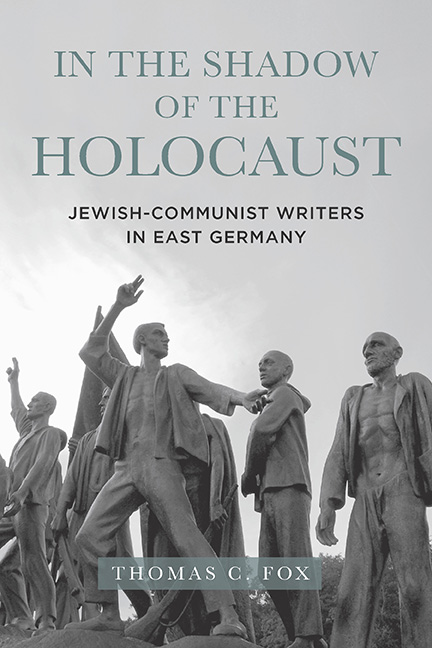Book contents
- Frontmatter
- Contents
- Preface
- Introduction: In the House of the Hangman
- Chapter One The Dead Mother: Anna Seghers
- Chapter Two Stefan Heym’s Negotiation of Communist-Jewish Identity
- Chapter Three The Dead Wife: Stephan Hermlin
- Chapter Four Expanding East German Holocaust Discourse: Peter Edel and Fred Wander
- Chapter Five The Dead Father: Jurek Becker
- Conclusion: “Let Us Speak German for an Hour.”
- Works Cited
- Index
Introduction: In the House of the Hangman
Published online by Cambridge University Press: 26 May 2022
- Frontmatter
- Contents
- Preface
- Introduction: In the House of the Hangman
- Chapter One The Dead Mother: Anna Seghers
- Chapter Two Stefan Heym’s Negotiation of Communist-Jewish Identity
- Chapter Three The Dead Wife: Stephan Hermlin
- Chapter Four Expanding East German Holocaust Discourse: Peter Edel and Fred Wander
- Chapter Five The Dead Father: Jurek Becker
- Conclusion: “Let Us Speak German for an Hour.”
- Works Cited
- Index
Summary
Writing in the New York Times from the last days of East Germany in 1989, after the fall of the Wall and shortly before that country would disappear into West Germany, David Binder noted:
The Jewish issue here is complicated further by the fact that many of the top Communist leaders in power here after the war were men and women of Jewish origin. Among them were Hermann Axen, the foreign affairs specialist in the party Politburo until two months ago; Albert Norden, the late propaganda specialist in the Politburo; Gerhard Eisler, the chief commentator of East German radio; his brother, Hanns Eisler, the composer of the national anthem; the late Hilde Benjamin, Minister of Justice in the Stalinist period, and Markus Wolf, the former head of espionage. (December 11, 1989)
Binder's catalog of names mentions some of the more prominent and powerful German-Jewish Communists, and we could expand the list greatly, especially if we were to include the numerous German-Jewish artists and writers who relocated to East Germany after the Second World War. Of particular interest here is Binder's inclusion of Hilde Benjamin. Infamous for her Stalinism, her management of show trials, her draconian sentencing, including her use of the death penalty, she received such nicknames as “Red Hilde,” “Bloody Hilde,” and even the “Red Freisler,” after the notorious Nazi judge. In short, she seemed to embody the postwar avenging Jew, mercilessly condemning ex-Nazis or anyone who deviated from the East German antifascist Communist Party line. In a remarkable antisemitic slander, the prolific best-selling author Charles Whiting describes Benjamin reading the Talmud to classical music and candlelight after meting out death sentences (1972, 133–34).
Hilde Benjamin was not Jewish, however. Her parents were Lutherans; she considered herself an atheist. She did marry into a prominent German-Jewish family: her husband, Georg Benjamin, was a Communist persecuted by the Nazis, who eventually murdered him in the Mauthausen concentration camp. Her brother-in-law was the famous philosopher Walter Benjamin who took his own life after having been pursued by the Nazis. To be fair, David Binder's mistake is not uncommon, perhaps because Benjamin's actions appeared to be a logical consequence of Jewish wartime suffering. Yet, as the Jewish-German writer Jurek Becker once remarked, acts of revenge from Jewish survivors living in postwar Germany in fact remained surprisingly rare (Hage 1987, 338).
- Type
- Chapter
- Information
- In the Shadow of the HolocaustJewish-Communist Writers in East Germany, pp. 1 - 26Publisher: Boydell & BrewerPrint publication year: 2022



